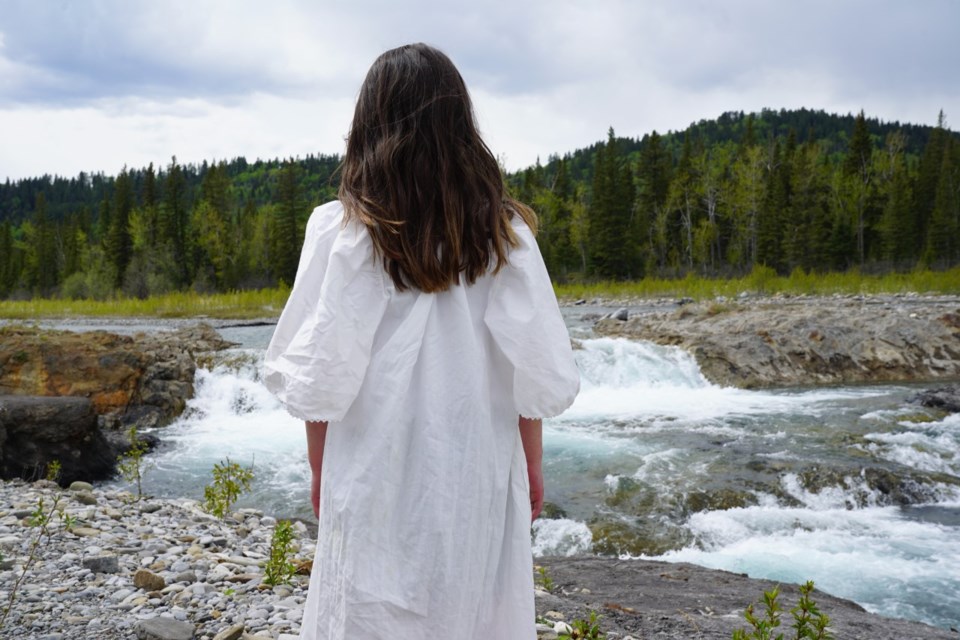COCHRANE: A local filmmaker is in the midst of bringing the story of residential school survivor Elder Betty Ross to the big screen, with the help of Indigenous people from the Cochrane area and other parts of western Canada.
Eppo Eerkes is producing Return to the Falls, a docu-drama that combines real-life footage with dramatic re-enactments to tell a powerful story his then-eight-year-old daughter Denai insisted he tell after she read about it 10 years ago.
While filming another project near Alert Bay, B.C., Eerkes and Denai came across St. Michael's Indian Residential School, which had been operated by the Anglican Church of Canada for First Nations children.
The school was still there at the time (it has since been torn down), and Eerkes was able to meet some former students.
One day, his daughter came out of a museum next door to the school with a small book she asked if she could buy, about Elder Betty Ross.
“She read it and cried herself to sleep that night,” he said. “And woke up the next morning and said, ‘Dad, you have to help tell the story,’”
Eerkes agreed, and the project was born – Return to the Falls.
It’s been 10 years since he found Betty Ross, who was 65 at the time and working at a hospital in Winnipeg.
When Eerkes explained to Ross that his daughter had found the book and wanted him to help tell her story, Ross replied, “I’ve been waiting for your call.”
Over the course of years of research and after eight-hour days of conversations with the now 76-year-old Ross, Eerkes heard that her dream is to one day return to Sugar Falls.
In the middle of winter at her home in Cross Lake First Nation in northern Manitoba, Ross’s adopted father found her huddled under a canoe, with hypothermia setting in. She was seven years old and had already been kicked out of her house several times by her mother, who struggled with alcohol addiction, and was a residential school survivor.
“She had been kicked out of her house several times by her mother, who felt guilty about not being able to care for her,” Eerkes said.
On this occasion, she wandered off into a storm before her adopted father found her under the canoe.
Ross’s father wanted to prepare her for whatever challenges she might face in the future by helping her with some cultural learning.
One day, he took her up a river in a canoe to a place called Sugar Falls.
Once there, he lit a ceremonial fire and began teaching her about The Four Directions, and traditional Indigenous ways of living as taught by her Swampy Cree people.
The Four Directions are a fundamental Indigenous teaching based on the Medicine Wheel, as represented by the four directions. It symbolizes the cycle of life and provides guidance for living.
The teachings went on for the next couple of years until one day, a Catholic priest from St. Joseph’s residential school across the lake paddled up to their home in a canoe.
“He literally picked her up, in front of her dad and mom, and put her in the canoe, yelling and screaming,” Eerkes said.
There was nothing they could do. At the time, priests would call the RCMP to help take children away if they met any resistance.
That traumatic instance marked the beginning of a long, painful odyssey through different residential schools for Ross. She would not return home for 20 years.
Cross Lake Band/Pimicikamak Cree Nation announced last year that it’s looking into St. Joseph’s Residential School, which closed in 1969, as discoveries of unmarked graves at residential school sites continue across the country. They will be using ground penetrating radar to assist in the investigation.
Ross now lives in Winnipeg, which is where Eerkes met with her.
“The goal for her is to go back to the place where those teachings from her father first happened,” he said.
Eerkes has reached out to local Indigenous people to help him tell Ross’ story and has an 80 per cent Indigenous crew ready to complete filming in Alberta locations this summer.
Some of that work will be done locally, along the Elbow River near Bragg Creek.
Eerkes said he also has had strong support from Elder Bruce Starlight from Tsuu T’ina Nation.
Local Indigenous people will also appear in the film. Roger Hunter, who plays Betty’s father in the re-enactments, is Stoney Nakoda. Savannah Hope-Taylor, a Cochrane High School student, plays Elder Betty as a teenager (the girl on the swing in the trailer).
Return to the Falls is an Indigenous-led, majority Indigenous-owned project. Black Badge Studios is an Alberta company, and Eerkes is a Cochrane resident, who moves around a lot.
“My office is outdoors,” said the filmmaker, who has produced shorter films for Animal Planet, filming grizzly bears in Canada and wildlife in Africa.
The Cochranite’s work has garnered a variety of provincial and international nominations and awards, including A Day Inside the Calgary Stampede, which was nominated for a Gemini, and won Best Documentary at the Alberta Film & Television Awards.
Eerkes hopes his latest film will help educate people about the dark legacy of residential schools – something he feels is still lacking in school-based curricula.
In closing, he said the story of how Indigenous and non-Indigenous people have collaborated on the making of this film, and can work together, is just as important as the movie itself.
To view the trailer for Return to the Falls, go to blackbadgestudios.com/videos.



